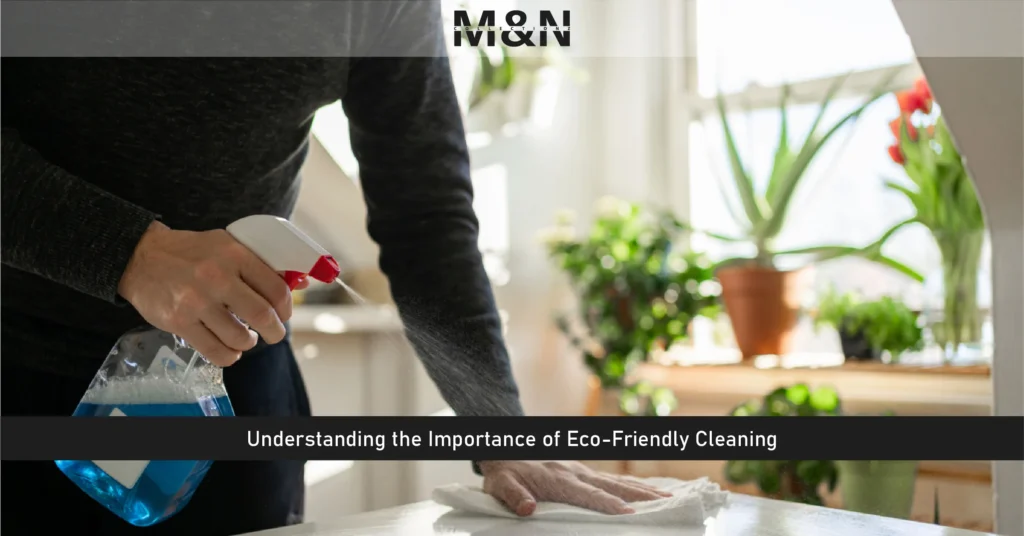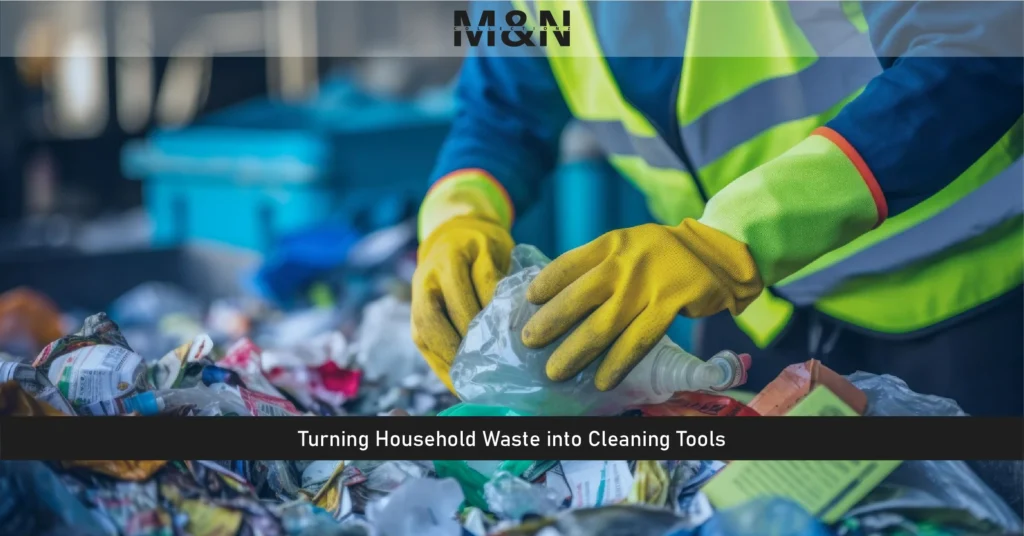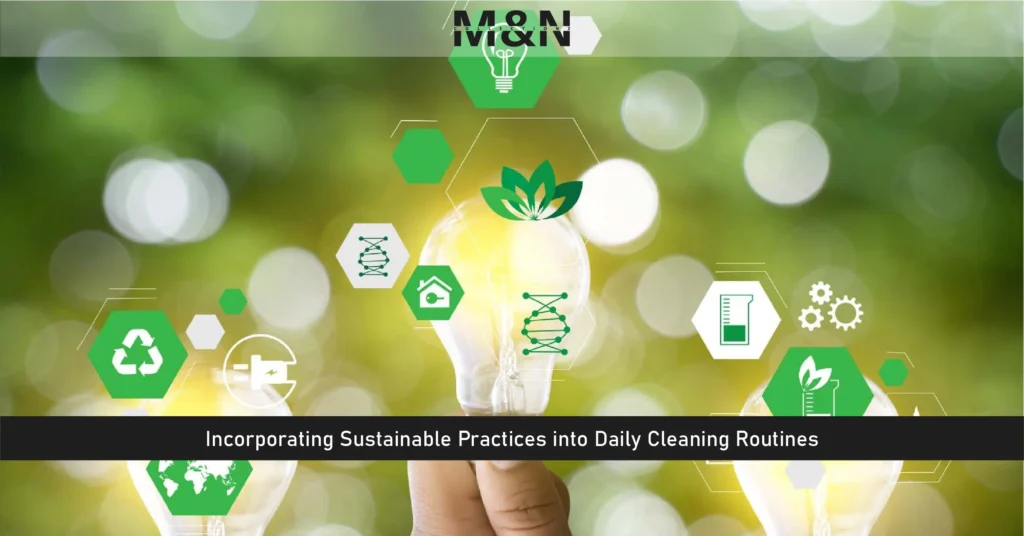10 Eco-Friendly Cleaning Hacks for a Sparkling Home

We often forget how our cleaning choices affect our health and the planet. This article shares ten eco-friendly cleaning hacks. They make our homes shine while being kind to the environment.
By using these natural cleaning remedies, we cut down on waste. This helps us live more sustainably. Let’s explore these easy tips together. They’ll make cleaning better for our planet and our health.
Table of Contents
Understanding the Importance of Eco-Friendly Cleaning
Every day, the cleaning products we pick can really affect our health and the planet. Choosing sustainable cleaning helps us use effective methods that are also kind to the environment. This way, we make our living spaces healthier.
Benefits of Sustainable Cleaning Practices
Sustainable cleaning uses natural ingredients that are good for the planet. These products improve the air in our homes, making them safer for our families. By choosing eco-friendly options, we reduce harmful chemicals in our environment.
This shows that we can keep our homes clean without harming the planet.
Impact on Health and the Environment
The health effects of cleaning products are huge. Many common cleaners have harsh chemicals that can harm us. Switching to eco-friendly products makes our homes safer and supports communities affected by chemicals.
By avoiding toxic substances, we create healthier homes and protect our planet for the future.

10 Eco-Friendly Cleaning Hacks for a Sparkling Home
Looking for a clean home? Try eco-friendly cleaning hacks. They use natural ingredients to keep your home clean and safe. Here are ten easy and effective ways to clean your home the green way.
- Citrus Peels: Use leftover citrus peels to freshen up the garbage disposal. Simply toss them in and let the natural oils work their magic.
- Baking Soda: A versatile powerhouse, baking soda scrubs away grime and neutralizes odors. Sprinkle on carpets before vacuuming for a refreshing boost.
- Vinegar: This natural cleaner deodorizes and cuts through tough stains. Mixing equal parts vinegar and water creates an effective all-purpose cleaner.
- Olive Oil: Use olive oil to polish wooden furniture, giving it shine while conditioning the wood.
- Essential Oils: Add a few drops of essential oils like lavender or tea tree to homemade cleaners for a pleasant scent and antibacterial properties.
- Castile Soap: This biodegradable soap can clean almost anything, from floors to dishes, making it a fantastic eco-friendly cleaning option.
- Salt: Use salt to scrub pots and pans. It acts as an abrasive cleaner while being gentle on surfaces.
- Hydrogen Peroxide: As a natural disinfectant, hydrogen peroxide can tackle tough stains and sanitize surfaces effectively.
- Cornstarch: This kitchen staple can clean windows and polish furniture. Mix with water to create a paste for polishing surfaces.
- Reusable Rags: Swap single-use paper towels for reusable rags made from old clothes. This simple change reduces waste and proves to be a sustainable cleaning solution.
By using these eco-friendly cleaning hacks, we can keep our homes clean and help the planet. Each hack is a simple way to make cleaning easier and more sustainable.
Using Natural Ingredients for Effective Cleaning
We can make our cleaning routines better with natural ingredients. Using eco-friendly kitchen items lets us make safe and effective DIY cleaners. Items like baking soda, lemon juice, and vinegar are great for cleaning and don’t cost much.
Common Kitchen Staples for Cleaning
Baking soda, lemon juice, and vinegar are key for cleaning. Baking soda is gentle and perfect for scrubbing without scratching. Lemon juice cuts through grease and gets rid of bad smells.
Vinegar is a great disinfectant for cleaning surfaces and removing stains. It’s a must-have for keeping things clean.
How to Create DIY Cleaning Solutions
Making your own cleaners is easy and fun. A simple all-purpose cleaner is water and vinegar mixed in a spray bottle. Add a few drops of essential oil for a nice smell.
For grease, mix baking soda and water into a paste. It’s a strong degreaser. These natural cleaners are safe and good for a healthy home.
Green Cleaning Solutions for Every Room
Looking for a cleaner, healthier home? We need to explore green cleaning solutions for every room. Using natural ingredients makes cleaning easier and helps the environment. In the kitchen, eco-friendly hacks can tackle tough messes. The bathroom has its own challenges, but simple, safe ingredients can solve them.
Eco-Friendly Hacks for the Kitchen
Lemon is a great tool in the kitchen. It cuts grease and smells fresh. Mix lemon juice with baking soda for a paste that cleans surfaces well.
For bad smells, lemon slices in the fridge or garbage disposal work great. These kitchen hacks keep our spaces clean and safe for our families.
Refreshing Bathroom Cleaning Tips
Bathrooms get soap scum and hard water stains. A mix of vinegar and baking soda is a simple solution. Sprinkle baking soda, then vinegar, for a fizz that removes grime.
By using these tips, we keep our bathrooms fresh and clean. No harsh chemicals needed.
| Room | Natural Ingredient | Cleaning Purpose |
|---|---|---|
| Kitchen | Lemon | Grease removal and odor elimination |
| Kitchen | Baking Soda | Surface cleaner |
| Bathroom | Vinegar | Stain removal and deodorizing |
| Bathroom | Baking Soda | Soap scum removal |
Turning Household Waste into Cleaning Tools
Turning our household waste into cleaning tools is smart for our wallets and the planet. It helps us keep our homes clean without adding to waste. By using old items in new ways, we make effective and green DIY cleaning tools.
Repurposing Old T-Shirts and Towels
Old t-shirts and towels are great for dusting and cleaning. We can cut them into sizes that are easy to use. This choice helps us avoid disposable wipes and cuts down on waste.
It also saves us money and supports a greener cleaning habit.
Creating Scrubbing Pads from Sponges
Used sponges can be turned into useful cleaning tools. We can cut them up and mix them with old fabric to make scrubbing pads. These pads are tough on dirt and are a key part of our green cleaning kit.
By getting creative, we make sure we’re not wasting materials. Instead, we find new uses for them.

Making the Most of Essential Oils
Essential oils are powerful tools in our eco-friendly cleaning arsenal. They serve as natural disinfectants and add delightful fragrances to our spaces. By understanding different essential oils, we can choose the best for our cleaning needs. This makes our cleaning routines more effective and eco-friendly.
Natural Disinfectants and Fresheners
Essential oils offer a double benefit for cleaning. Oils like tea tree, eucalyptus, and lavender kill germs and bacteria without harsh chemicals. Their antimicrobial properties keep our homes clean and safe for our loved ones.
Essential oils also act as eco-friendly fresheners. Adding lemon or peppermint oil to our cleaning solutions brings a refreshing scent. This uplifts our mood and makes our living spaces aromatic sanctuaries.
Choosing the Right Oils for Cleaning
Choosing the right essential oils for cleaning tasks makes them more effective. Below is a table highlighting popular essential oils and their specific cleaning benefits:
| Essential Oil | Cleaning Benefit | Best Uses |
|---|---|---|
| Tea Tree Oil | Natural disinfectant with antimicrobial properties | Bathroom cleaners, surface wipes |
| Lavender Oil | Soothing scent that also combats bacteria | Fabric sprays, air fresheners |
| Lemon Oil | Powerful degreaser and disinfectant | Kitchen cleaners, countertops |
| Eucalyptus Oil | Effective against mold and mildew | Shower cleaners, laundry aids |
| Peppermint Oil | Invigorating scent that repels pests | Surface sprays, outdoor areas |
By using essential oils in our cleaning, we create a healthier home environment. Each oil offers unique benefits, helping us tailor our cleaning to our needs in an eco-friendly way.
How to Use Vinegar and Baking Soda Wisely
We can make our homes cleaner with vinegar and baking soda. These items are great on their own and even better together. They are perfect for removing tough stains and odors, making our homes smell fresh.
Powerful Combos for Tough Stains
Vinegar is a good first choice for tough stains. Mixing it with baking soda creates a fizz that helps remove dirt. Here are some effective combinations:
- Bathroom Grime: Mix equal parts vinegar and baking soda for a paste. Apply it to tiles and grout, let it sit for 10 minutes, and scrub away.
- Kitchen Grease: Sprinkle baking soda on greasy surfaces, spray with vinegar, and let it foam. This breaks down tough grease effectively.
- Fabric Stains: For laundry, mix vinegar and baking soda to remove stains. Add it before washing for a fresh scent.
Safe and Eco-Friendly Deodorizing Solutions
Vinegar and baking soda are not just for cleaning. They also make great deodorizers. Here are some ways to use them:
- Fridge Odors: Place an open box of baking soda in the fridge to absorb smells. A small bowl of vinegar can neutralize odors.
- Carpets: Sprinkle baking soda on carpets before vacuuming to eliminate odors. Then, lightly spray with vinegar to refresh the fibers.
- Airing Freshness: Spray a mix of vinegar and water as a room deodorizer. This combo effectively gets rid of bad smells.
Using vinegar and baking soda in our cleaning routines keeps our homes fresh and clean. These eco-friendly deodorizers help us enjoy a clean home that’s safe for our family and the planet.
Environmentally-Friendly Cleaning Tricks for Carpets and Upholstery
Using eco-friendly cleaning methods keeps our fabrics and the planet healthy. Natural carpet cleaners help remove stains and odors. This way, our homes stay clean and safe. We’ll look at natural solutions for tough stains and easy ways to care for our furniture.
Natural Removers for Stains and Odors
We can make safe cleaners with common kitchen items. Here are some easy recipes to try:
- Baking soda paste: Make a paste with baking soda and water. Apply it to stains and wait 15 minutes. Then, rinse with a damp cloth.
- Vinegar solution: Mix equal parts white vinegar and water in a spray bottle. Use it to get rid of odors and freshen upholstery.
- Soap scum solution: For oily spots, mix a few drops of mild dish soap with water. Use a soft cloth to gently scrub and remove the stain without harming the fabric.
Simple Tips for Regular Maintenance
Keeping up with our furniture is key to its longevity. Here are some easy tips:
- Vacuum often to get rid of dust and dirt, which can wear down fabrics.
- Flip cushions every few months to avoid uneven wear and sagging.
- Deal with spills right away to stop stains from setting in. Use our natural cleaners for best results.
- Think about using eco-friendly fabric protectors to prevent future stains.
By using these green cleaning tips, we can keep our carpets and upholstery clean. This way, we care for our homes and the planet at the same time. Choosing natural cleaning options helps us live in a more sustainable way.
Making Your Own Biodegradable Cleaning Products
Making our own cleaning products is good for the planet and our homes. We can use simple ingredients to make effective cleaners without harsh chemicals. We can also store these products in ways that are kind to the environment, using eco-friendly solutions.
Easy Recipes for All-Purpose Cleaners
Here are some easy DIY cleaning recipes to make your own products:
- Citrus Vinegar Cleaner: Mix equal parts of vinegar and water with citrus peels. Let it sit for two weeks. Strain before use for a natural cleaner.
- Baking Soda Paste: Mix baking soda with water to make a paste. It’s great for scrubbing tough stains and grime.
- Castile Soap Solution: Mix water with a few drops of Castile soap. It’s a powerful yet gentle cleaner for many surfaces.
Packaging and Storage Solutions
Proper storage keeps our cleaning products fresh and effective. Here are some eco-friendly storage ideas:
- Use glass spray bottles. They’re recyclable and reduce plastic waste.
- Repurpose old containers for different cleaners. Make sure they’re labeled safely.
- Store products in cool, dark places. This helps keep essential oils effective.
| Cleaning Solution | Main Ingredients | Usage | Storage Method |
|---|---|---|---|
| Citrus Vinegar Cleaner | Vinegar, Citrus Peels | All-purpose cleaning | Glass spray bottle, cool dark place |
| Baking Soda Paste | Baking Soda, Water | Stain removal | Reusable container, airtight |
| Castile Soap Solution | Castile Soap, Water | Surface cleaning | Glass bottle, labeled |
By using these recipes and storage tips, we help our homes and the planet. Let’s choose these sustainable cleaning options.
Incorporating Sustainable Practices into Daily Cleaning Routines
Adding sustainable cleaning to our daily lives makes our homes better and us healthier. A good cleaning plan helps us live greener and cleaner. By making a family cleaning schedule, we can share the work and make it easier.
Creating a Cleaning Schedule
A cleaning schedule is like a guide for a clean home. It helps us stick to eco-friendly habits. We can set up tasks for each day, week, and month. For example, we can pick a day for each room to avoid using too many chemicals.
Here’s a simple schedule:
| Day | Room/Task | Eco-Friendly Tips |
|---|---|---|
| Monday | Kitchen | Use vinegar and baking soda for natural cleaning |
| Tuesday | Living Room | Dust with reused cloths to minimize waste |
| Wednesday | Bathrooms | Employ essential oils for freshening |
| Thursday | Bedrooms | Use natural fabric fresheners on bedding |
| Friday | Floors | Opt for a vinegar-water solution for mopping |
| Saturday | Outdoor Spaces | Clear debris and recycle when possible |
| Sunday | Family Clean-Up | Involve everyone for teamwork |

Encouraging Family Participation in Cleaning
Getting everyone involved in cleaning makes it fun and builds bonds. We can give tasks based on age and explain why it’s important. This teaches kids about taking care of our planet.
When we all work together, our home gets cleaner and we learn about teamwork. We can make our home a greener place for everyone.
Conclusion
Using eco-friendly cleaning helps keep our homes clean and protects our health and the planet. By choosing sustainable cleaning, we make our daily cleaning better for the Earth. Every small change we make can help a lot for the future.
Using natural ingredients and sustainable habits makes us think more about our planet. Choosing green cleaning is more than just cleaning our homes. It’s about living in a way that’s good for us and the Earth.
By using eco-friendly cleaning, our homes stay clean and safe. We can all make a big difference in our homes and help the planet. Let’s work together to make our homes and planet healthier.
Also Read: Children’s Fashion Trends for 2025: What’s In and What’s Out
FAQs:
What are the best natural ingredients for eco-friendly cleaning?
Common kitchen staples like vinegar, baking soda, lemon juice, and essential oils make effective, non-toxic cleaners. These ingredients tackle grease, stains, and odors without harsh chemicals.
How can I make my own all-purpose cleaner at home?
Mix equal parts water and white vinegar in a spray bottle, adding 10-15 drops of essential oil for fragrance. This simple solution disinfects surfaces while being safe for kids and pets.
Are DIY cleaning products as effective as store-bought ones?
Yes—natural solutions like baking soda paste and vinegar work well for most cleaning tasks. They may require slightly more elbow grease for tough stains but are equally effective without toxic residues.
What’s the easiest way to reduce waste while cleaning?
Switch from paper towels to reusable rags (old t-shirts or towels) and repurpose containers for homemade cleaners. This cuts down on single-use waste significantly.
How can I involve my family in sustainable cleaning habits?
Create a shared cleaning schedule with age-appropriate tasks, teaching kids how to use natural cleaners. Making it a team effort reinforces eco-conscious habits for everyone.

